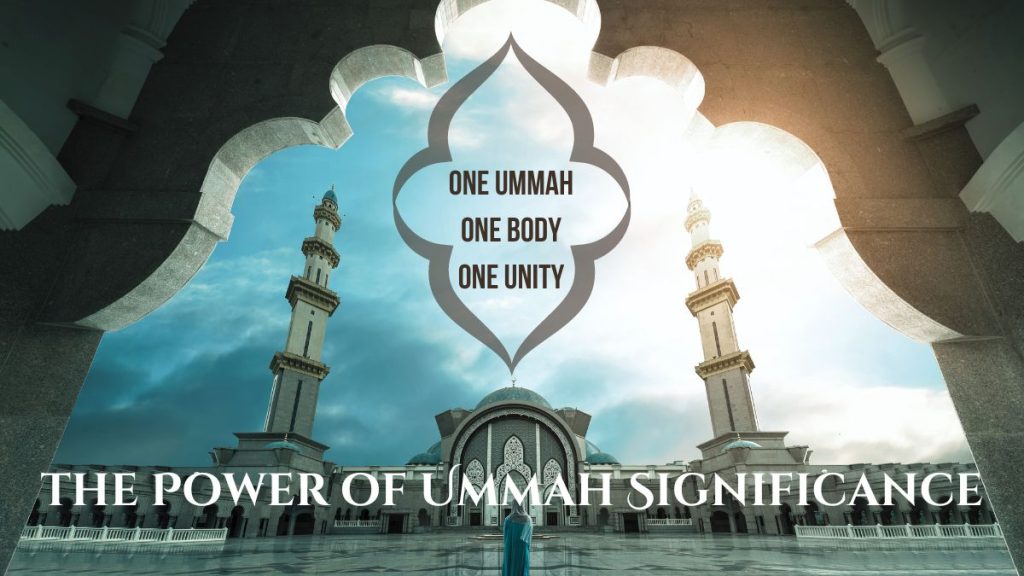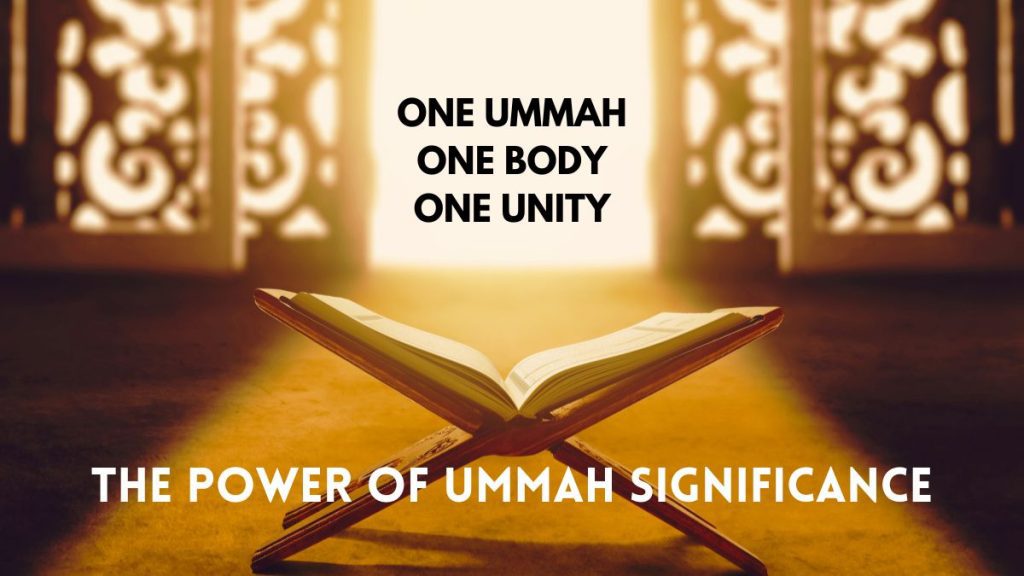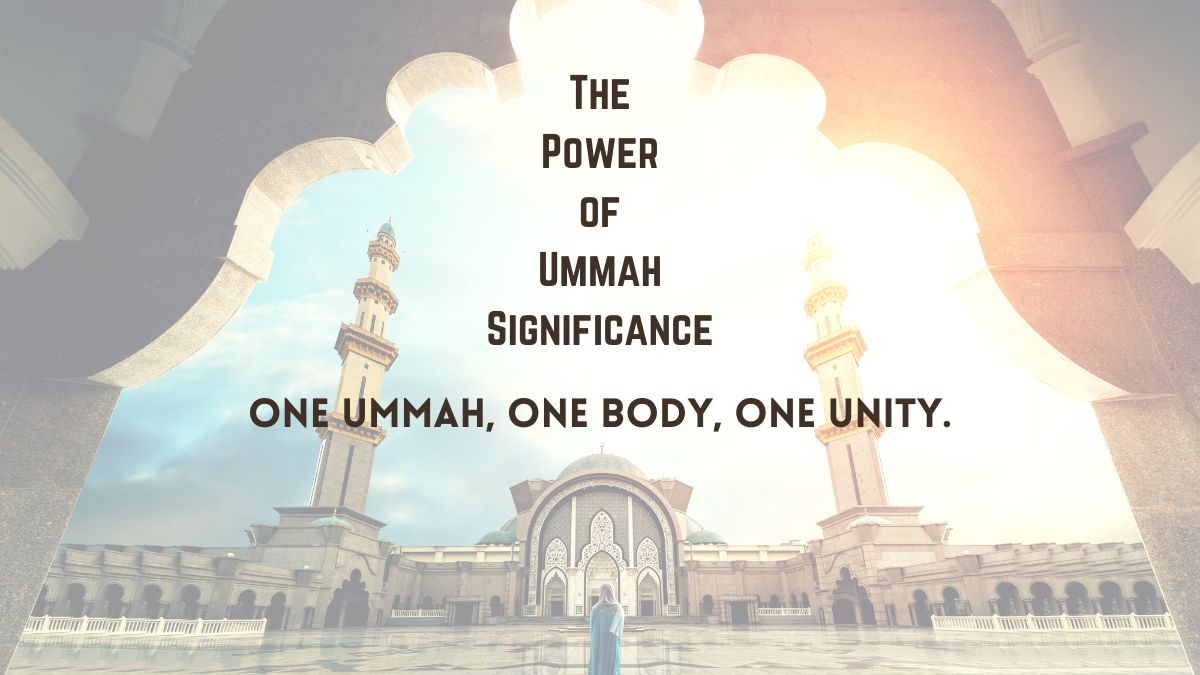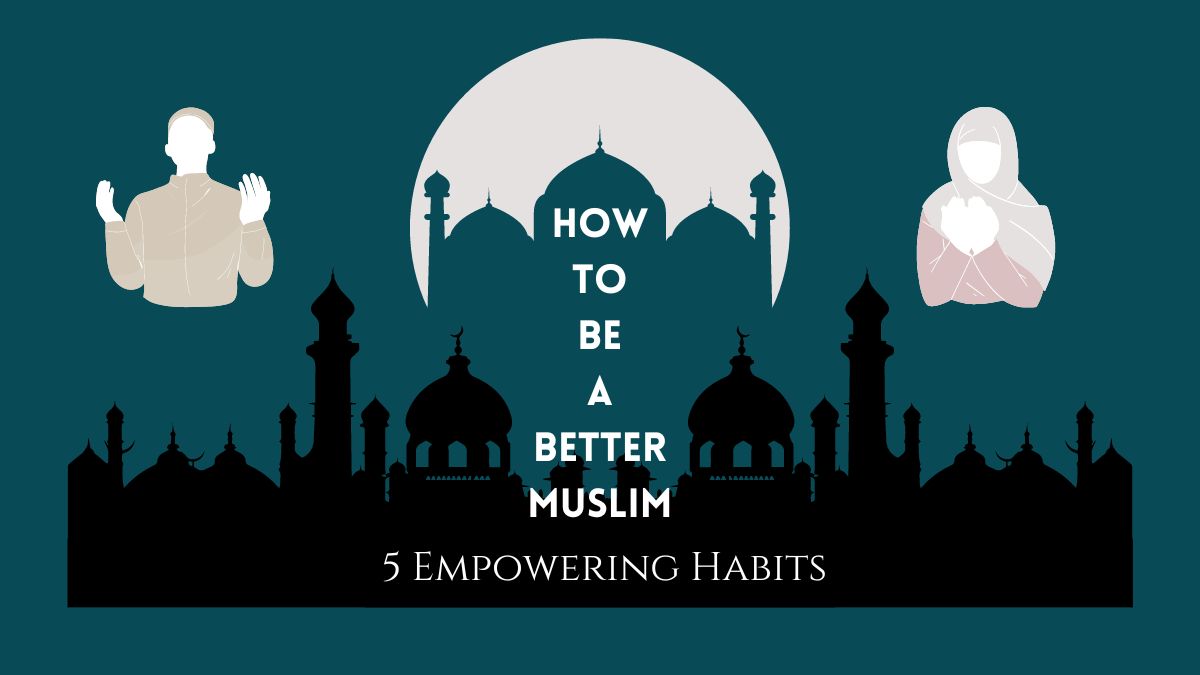The significance of Ummah lies in the unity and solidarity of the Muslim community. Ummah is a concept that promotes brotherhood and mutual support among Muslims around the world.
The idea of Ummah dates back to the time of Prophet Muhammad (PBUH) and is rooted in Islamic teachings. It is a symbol of shared beliefs and values, as well as a call to work together for the greater good.
Ummah represents a sense of belonging and identity that transcends geographic and cultural boundaries. It also helps to foster a strong bond between Muslims and strengthen their faith. The significance of Ummah is particularly relevant in today’s world, where division and conflict are prevalent. By embracing the concept of Ummah, Muslims can show the world the power of unity and lead by example.
Related Article: The Power of Islam: Unleashing its Transformational Potential

Related Article: Peace in Islam: Understanding its Amazing Transformational Power
You may also read: Islam And Modernity: Bridging Tradition and Progress
The Meaning Of Ummah
Ummah refers to the Islamic community who share a common faith, belief, and practices. It is a significant concept in Islam as it promotes unity, brotherhood, and cooperation among Muslims worldwide.
Exploring The Concept Of Ummah
Ummah is an Arabic word that means “community” or “nation”. In Islam, the word Ummah means the Muslim community as a whole, worldwide. It refers to the collective body of Muslims who are bound together by their faith, beliefs, and practices. The Ummah is a fundamental concept in Islam, and it holds great significance for Muslims. As part of the Ummah, Muslims have a responsibility to support and help one another, whether they are neighbors or living on different continents. The Ummah is not just a religious community; it is also a social and political entity that has influenced the course of history.
Understanding The Significance Of Ummah In Islam
The Ummah has significant importance in Islam, as it provides a sense of belonging, unity, and brotherhood among Muslims. The concept of Ummah helps to unify Muslim society by breaking down barriers of race, ethnicity, and nationality. Muslims from diverse backgrounds can come together and form a bond based on their shared faith and common values. The Ummah also plays a crucial role in spreading and practicing Islamic teachings. It is a platform for Muslims to exchange ideas and knowledge, to engage in religious discussions, and to seek help and guidance from others. The Prophet Muhammad (Peace be upon Him) emphasized the importance of Ummah in many of His sayings. For example, He said, “The believers are like a single body; when any part of it suffers, the whole body feels the pain.” This Hadith highlights the idea that Muslims should feel empathy and compassion for one another. They should work together to solve problems and support each other in times of need.
The Role Of Ummah In Contemporary Times
The concept of Ummah is as relevant today as it was in the early days of Islam. In today’s highly globalized world, Muslims face numerous challenges, including Islamophobia, intolerance, and prejudice. The idea of Ummah can help Muslims navigate these challenges by providing a sense of identity, purpose, and community. It can help Muslims to stand in solidarity with each other and to work for the betterment of the Muslim community and the world at large. To conclude, the concept of Ummah holds great significance in Islam. It offers Muslims a sense of community, belonging, and unity. As part of the Ummah, Muslims can benefit from the collective support, guidance, and wisdom of others. The Ummah is not limited to any particular geographic region or ethnicity. It is a universal concept that holds together Muslims from all corners of the world. As such, it is an essential part of the Islamic faith that has contributed to the richness and diversity of Muslim culture.
Related Article: The Role of Mosques in Islam: Spiritual Hubs and Community Centers
You may also read: The Role of Imam in Islam: Guiding Faith and Community
The Power Of Unity
Unity is one of the most essential elements in the life of humans and Muslims. In Ummah, the power of unity strengthens faith and upholds the Quranic injunctions of brotherhood and solidarity. When Muslims come together in unity, they can break down barriers, overcome challenges, and foster progress and development. Unity is a cornerstone of our faith and reflects our commitment to working together and supporting one another towards the common goal of building a strong, prosperous and peaceful Ummah.
Examining The Benefits Of Unity In The Ummah
The unity of Ummah has numerous benefits. One of the most significant benefits is that it instills a sense of belonging among the Muslims, regardless of race, ethnicity, or geographical barriers. Unity allows Muslims to support each other in times of need and celebrate each other’s successes. It promotes the bond of brotherhood and sisterhood among Muslims. Unity helps to create understanding, compassion and it encourages empathy and compassion.
The Role Of Unity In Fostering Progress And Development
The unity of the Ummah is necessary for progress and development. With unity, Muslims can pool their resources and work together towards achieving common goals. It creates a stronger front which enables the Ummah to make progress in various areas of life, from science and technology to social and economic development. Togetherness is the key to success, and Muslims can rely on each other’s strength to advance and achieve their objectives. It is by working together that the Ummah can prosper.
Overcoming Challenges Through Unity
Challenges and difficulties are common in life, and the Muslim community is not exempted. However, with unity, it is possible for the Ummah to overcome struggles and obstacles. When members of the Ummah united for a common cause, they can fight off oppression, intolerance, discrimination, and injustice. It is through their unity that they can overcome any challenge and emerge victorious. The diversity of the Ummah should be seen as a strength and not a weakness, working together in unity makes the Ummah stronger and more resilient.
The power of unity is infinite. It brings hope, strength, and courage to the Ummah. Muslims must never underestimate the significance of unity and its ability to bring progress, success, and prosperity to individual Muslims and the Ummah as a whole. Unity is a significant aspect of being a Muslim, and it is an essential ingredient for attaining success, both in this life and the hereafter.
Challenges To Ummah Significance
The Ummah, or the global Islamic community, faces several challenges to its significance. These challenges range from political instability to sectarian conflicts, shifting sociocultural norms, and non-Muslim attitudes towards Islam. However, the Ummah remains a key factor in Muslim identity, solidarity, and advocacy for social justice.
Despite being a community of over 1.7 billion Muslims worldwide, the Ummah faces a range of challenges that have an impact on its significance. There are various factors that undermine the Ummah’s unity, and these challenges need to be identified and addressed to strengthen the bond among Muslims.
Analysing The Factors That Undermine Ummah Significance
One of the biggest challenges facing the Ummah is sectarianism. This refers to the tension and division that exist between different sects in Islam. Unfortunately, sectarianism has resulted in violence, discrimination, and prejudice among Muslims. This type of division weakens the Ummah’s significance and tarnishes its reputation. Another factor that undermines the Ummah’s significance is the lack of understanding and knowledge about Islam. Misconceptions about Islam and its teachings lead to discrimination towards Muslims. This can create a sense of isolation and marginalization within the Ummah. It is essential to raise awareness and promote education about Islam to prevent discrimination and create harmony among Muslims. The rise of Islamophobia in recent years is also a significant challenge for the Ummah. This negative stereotyping and fear of Islam can create division and distrust among different communities. Islamophobia can also prevent Muslims from practising their faith freely, and this can impact their identity and belonging within the Ummah.
The Impact Of Sectarianism And Division On The Ummah
Sectarianism and division have a detrimental effect on the Ummah’s unity. It leads to a sense of competition instead of cooperation among Muslims. This lack of cooperation can make it difficult to address global challenges that require collective efforts, such as poverty, human rights, and justice. Sectarianism also weakens the Ummah’s reputation and makes it difficult for Muslims to present a united voice on global issues. It can also lead to conflict within Muslim countries and create a sense of instability and insecurity. In conclusion, the Ummah faces challenges that undermine its significance and unity. These challenges, such as sectarianism, misconceptions about Islam, and Islamophobia, need to be addressed to strengthen the bond among Muslims. The Ummah’s unity is vital to create a sense of belonging, identity and improve the collective well-being of Muslims worldwide.
Related Article: Tawheed: The Essence of Islamic Monotheism Explained

Credit: www.islamkuy.cloud
Related Article: What Makes Islam Unique: Insights & Distinctions
You may also read: The Five Pillars of Islam: A Comprehensive Guide
Forging A Stronger Ummah
Forging a stronger Ummah is crucial in promoting the unity, solidarity, and cooperation among Muslims around the world. A united Ummah can achieve great things. Islamic history shows numerous examples of how the power of a united Ummah defeated enemy forces and overcome severe challenges. Therefore, it is essential to remind ourselves of the importance of working together as one Ummah.
Steps To Foster Greater Unity Among Muslims
Promoting Inclusivity And Diversity Within The Ummah
The Ummah comprises Muslims from different regions, ethnicities, languages, and cultures. Therefore, it is crucial to promote inclusivity and diversity within the Ummah to ensure that everyone feels welcomed and valued. Adopting this approach strengthens the bonds of brotherhood and sisterhood among Muslims, thus building a solid foundation essential for forging a stronger Ummah. Creating an environment that embraces diversity means appreciating and respecting everyone’s similarities and differences. This approach fosters a sense of belonging, acceptance, and open-mindedness, leading to a more cohesive Ummah.
Ensuring Proper Communication And Collaboration
Clear and proper communication is key to building a stronger Ummah. Ensuring that information is communicated effectively amongst Muslims can help build trust, understanding, and respect. Additionally, it is essential to promote collaboration among Muslims by working together towards common goals. This approach helps in enhancing problem-solving skills, building networks, and creating successful partnerships. With proper communication and collaboration, Muslims can unite, overcome challenges and achieve their objectives.
Encouraging Civic Engagement Among Muslims
Encouraging civic engagement among Muslims is another essential step in building a stronger Ummah. Being an active participant in one’s community allows Muslims to connect, serve, and contribute positively to society. Engaging in civic activities such as volunteering, campaigning for social justice, and advocacy empowers Muslims, amplifies their voices, and inspires them to effect positive change. This approach also strengthens the bonds of brotherhood and sisterhood within the Ummah, creating a sense of common purpose and direction.
The Future Of The Ummah
The Ummah is a crucial concept in Islam, representing the community of Muslims worldwide. As the world changes rapidly, it is essential to examine the significance of the Ummah in shaping the future of nations and the world as a whole. The future of the Ummah is an important topic that needs discussion, and this post provides insight into exploring its potential and the role it plays in global affairs.
Exploring The Potential Of The Ummah
The potential of the Ummah is vast and untapped. With over 1.8 billion Muslims worldwide, the Ummah has a significant impact on world issues such as politics, social justice, and economics. By harnessing its potential, the Ummah can play a massive role in shaping the world’s future.
With the rise of technology, social media, and digital platforms, the Ummah has unique opportunities to network, share knowledge, and create interconnectedness. By leveraging these tools, the Ummah can foster collaboration among Muslims worldwide, leading to a unified front against social and political injustices.
The Role Of The Ummah In Global Affairs
The Ummah can play a significant role in global affairs, shaping the world’s policies and fostering conventional norms and values. Muslim nations face unique challenges, such as economic inequality, political instability, and social unrest, but by working together, they can create a united front, creating stability and influence globally and regionally.
Moreover, as the world becomes more interconnected through global initiatives, the Ummah needs to integrate its values to promote universal well-being. The ethical and moral values that Islam promotes can become cornerstones globally, leading to a better and more equitable world.
The future of the Ummah is ripe with possibilities, promising a better world by upholding Islamic values globally. Understanding its potential and role in global affairs can empower the Ummah to unite and foster change, leading to a better future for all.
Related Article: Islamic Spirituality: Unlocking Inner Peace and Enlightenment

Related Article: How to Be a Better Muslim: 5 Empowering Habits
To know more about The Power of Ummah Significance>>
Conclusion
As Muslims, it is essential to understand the significance of Ummah, not just from a theological perspective but also as a tangible force that binds us all together. This understanding plays a vital role in realizing the collective responsibility that we have towards each other.
By working together, we can create a strong and cohesive community that benefits not only ourselves but also the world around us. Let us strive towards building a more united and compassionate Ummah.
Related Article: How Does Islam Affect Daily Life: Unveiling the Impact





5 thoughts on “Unlocking the Power of Ummah Significance”